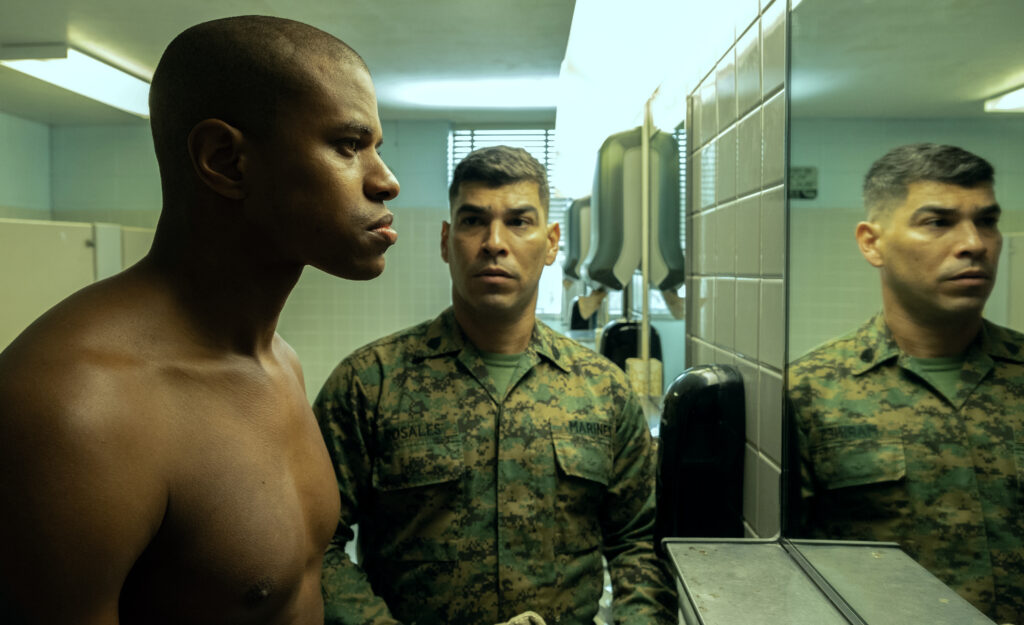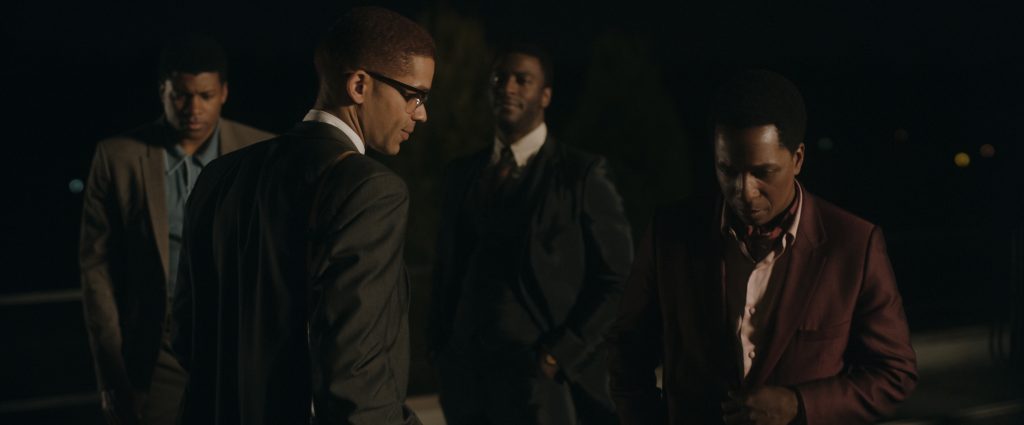November 18, 2022
by Carla Hay

Directed by Elegance Bratton
Culture Representation: Taking place in 2003, on Parris Island, South Carolina, and briefly in New York City, the dramatic film “The Inspection” features a racially diverse cast of characters (African American, white, Latino and Middle Eastern) representing the working-class and middle-class.
Culture Clash: Based on a true story, a 26-year-old African American gay man enlists in the U.S. Marines to escape from homelessness, and he has to deal with rampant homophobia and bullying during his boot camp training.
Culture Audience: “The Inspection” will appeal primarily to people who are fans of stars Jeremy Pope, Gabrielle Union and well-acted dramas about LGBTQ people in the U.S. military.

Even when “The Inspection” becomes a little too repetitive in its drama, the movie shines brightest where it matters the most. Elegance Bratton tells a very authentic, heartfelt story of homophobia that he experienced inside and outside the U.S. military. The movie is based on Bratton’s real-life triumphs and traumas during his boot camp training in the U.S. Marines. There have been other movies about LGBTQ people who tried to hide their sexualities in the military, but “The Inspection” is a rare movie were the gay protagonist in the military is an African American cisgender man.
Bratton wrote and directed “The Inspection” as a semi-autobiographical film where the protagonist goes through many of the same things that Bratton went through in real life. Several characters are based on real people, while some characters are fictional. “The Inspection” had its world premiere at the 2022 Toronto International Film Festival and its U.S. premiere at the 2022 New York Film Festival.
The movie takes place in 2003, during the era when the U.S. military banned any sexuality that isn’t heterosexual, but there was a “don’t ask, don’t tell” policy when it came to disclosure of the sexualities of people in the U.S. military. In the beginning of the movie, Ellis French (played by Jeremy Pope), who prefers to be called French, is a 26-year-old homeless man. He lives in New York City, and he has been homeless for about 10 years. When he was 16 years old, his very homophobic mother Inez French (played by Gabrielle Union) kicked him out of their home because French (who is an only child) is gay. All of this happened to Bratton in real life, as he has said in many interviews.
French has no other relatives he can turn to for support. He never knew his father, who abandoned Inez when she was pregnant with French. French has a tight-knit group of friends, many of whom are also openly queer, but he’s become tired of having an unstable and dangerous lifestyle on the streets. It’s mentioned at one point in the movie that some of his friends have died from violent crimes, while others have died from AIDS, and others are in prison.
French doesn’t want to end up in any of these situations. His mother Inez works as a corrections officer at a prison, and she already thinks that French is a major disappointment. French does not want to risk doing anything that could further alienate his mother. French goes to his mother’s apartment unannounced to ask her for his birth certificate. Why? French has decided that he’s going to enlist in the U.S. Marines to receive training in a career so he won’t have to be homeless anymore.
Inez and French have been estranged for years, but French never stops wanting his mother’s love and acceptance. When he shows up at her door, she’s not happy to see him, because she knows he’s homeless. Inez immediately asks French, “Are you in trouble?” Inez mentions that she’s been getting “notice to appear” courtroom documents addressed to him in the mail. He tells her about his life as a homeless person: “You have no idea how hard it’s been … Something has to change.”
When French tells her the reason for the visit, Inez laughs at the thought of French committing to something as demanding and strict as the military. She is also skeptical that French will be able to hide the fact that he’s gay. “What about your lifestyle?” she asks, as an indication that she thinks homosexuality is a choice.
At first, Inez doesn’t want to give him his birth certificate, but she eventually does when she sees that French is serious, and he’s not going to change his mind. Even though the vast majority of “The Inspection” takes place during French’s training on Parris Island, South Carolina, he continues to make attempts to connect with his mother in New York. His attempts are usually rejected.
When French is at his former home with his mother, she tells him exactly what she thinks about French: “I made peace with losing you.” When she gives him the birth certificate, Inez tells French: “This piece of paper is all I have left of the son I have birth to. If you don’t come back, consider this birth certificate void.” There are indications that Inez has misguided hope that somehow, being in the military will turn French into a heterosexual.
French is so determined to leave his homeless life behind, before he leaves for boot camp, he gives his cell phone to an elderly homeless man named Shamus (played by Tyler Merritt), who was French’s friend on the streets. Shamus, who calls himself an “old queen,” comments to French about French’s enrollment in the U.S. Marines: “You don’t have to do this. You can be anything you want to be.” French replies, “You and I both know that’s not true.” Shamus adds with stern words of encouragement, “I better not see you back here.”
French’s boot camp training is depicted exactly how you think it will go, based on how boot camp has been portrayed in many other movies and TV shows. There’s the shouting, macho drill sergeant, who uses his superior position to bully new recruits, especially those he thinks are the weakest emotionally and physically. This cruel tyrant is named Laws (played by Bokeem Woodbine), who constantly hurls abusive insults and who looks the other way when his underlings physically assault each other in their attempts to impress Laws and each other.
Laws, who is in his 40s, served in Operation Desert Storm. He the type of drill sergeant who snarls at his underlings: “I hate recruits, but I love Marines.” Later, in another scene, Laws says, “We don’t make Marines. We make monsters.” Although “The Inspection” has many emotionally raw and realistic-looking scenes, the movie occasionally falters with these types of corny statements from Laws.
Even though the U.S. military has a “don’t ask, don’t tell” policy in 2003, Laws breaks that policy by yelling at French in front of his fellow recruits: “Are you now or have you ever been a homosexual?” French is afraid of “outing” himself, so he shouts back, “No, sir!” It’s a lie that will eventually be exposed.
In addition to having a mean-spirited drill sergeant, another predictable aspect of “The Inspection” is the protagonist having a jealous rival, who is also a bully. His name is Harvey (played by McCaul Lombardi), who is very competitive and wants to be the “alpha male” of the recruits. Harvey expresses his homophobic views early on in the boot camp process. There are also big hints that Harvey (who is white) is racist against people who aren’t white. Harvey’s ego gets even more inflated when Laws appoints Harvey as the squad leader of the recruits.
At first, French thinks he can hide his sexuality, in order to avoid homophobic bullying and possible expulsion from the military. When the other recruits talk about their girlfriends and wives, French pretends that he has a female love interest too. The “special woman” he’s writing letters to is really French’s dismissive mother Inez.
French’s secret about being gay is eventually revealed when he and several other recruits (ncluding Harvey) are in a public shower. French starts thinking of a sexual fantasy about a good-looking drill sergeant in his 40s named Rosales (played by Raúl Castillo), who is Laws’ second-in-command. And the next thing French knows, his fellow recruits have noticed that French has an erection. French makes a half-hearted attempt to deny that he’s gay, but the secret is out. It gives Harvey and the rest of the homophobes even more of a reason to target French.
And so, for most of the movie, French is either shunned or abused (including beatings) by Harvey and some other recruits for being gay. Laws finds out and does nothing to stop this cruelty. In fact, when French tries to stand up for himself and threatens to report this abuse, Laws lets it be known that he hates snitches. Considering that Laws will be the one to decide which recruits will graduate from the training program, it puts French in a very precarious and vulnerable situation.
There are some bright spots to French’s traumatic and bleak experiences as a bullied recruit. He befriends another “outsider” recruit named Ismail (played by Eman Esfandi), who is harassed and insulted for being of Middle Eastern/Islamic heritage, during a time after 9/11 when hatred against Middle Eastern and Islamic people was encouraged in the U.S. war against Iraq and Afghanistan. Ismail is one of the few people who’s willing to stick up for French when things get very rough.
Another recruit named Castro (played by Aaron Dominguez) doesn’t really befriend French, but Castro doesn’t fully participate in the bullying against French either. Castro is someone who “goes along to get along” and tries to stay under the radar and not alienate anyone. But there’s a pivotal scene in the movie where Castro is forced to take a side, and he has to make a decision that will test his ethics and show his true character.
The person in the Marines who has the biggest emotional impact on French is drill sergeant Rosales, who is battling some personal demons of his own. Rosales wants to be a friendly mentor to French. However, French is sexually attracted to Rosales and wants a physically intimate relationship with him. Rosales is in a troubled marriage to a woman and is conflicted about his own sexuality. You can probably guess what that means in terms of the movie’s plot development.
French is often underestimated as being a “sissy,” but he proves to be a resilient and physically adept recruit who’s a fast learner. As his skills improve in the boot camp challenges, so does his confidence. And that’s a problem for Harvey, who doesn’t like to see French excel. Harvey is a stereotypical “villain” in this movie that doesn’t give him much of a backstory.
“The Inspection” greatly benefits from having a very talented cast, with Pope, Union and Castillo giving the standout performances. Their respective characters are also the best-written in the movie as fully formed human beings, instead of shallow stereotypes. Even with all the blood, sweat and tears that French experiences during boot camp, Pope’s soul-stirring performance never lets viewers forget that French’s real heartbreak comes from being rejected by his mother.
Union doesn’t have very many scenes in the movie, but when she’s on screen, she brings depth to her Inez character. Inez has self-righteousness about her homophobia because Inez genuinely believes that French’s sexuality means that he’s doomed to be in hell on Earth and elsewhere. Her anger toward French has other reasons too: As a single mother who had financial struggles in raising him, she somewhat blames him for giving her a harder life than she thinks she deserves.
Castillo’s Rosales character doesn’t talk much, but Rosales does a very credible job of expressing Rosales’ inner turmoil. Rosales is a good listener and observer who, unlike Laws, has a compassionate side. One of the best scenes in “The Inspection” is when Rosales asks French why French puts up with all the abuse he’s getting in boot camp and why French wants to be a Marine. This scene is partially shown in the movie’s trailer.
French candidly replies, “I’ve been raising myself since I was 16. My mom won’t even talk to me, If I die in this uniform, I’m a hero to somebody.” Although the story in “The Inspection” is mostly limited to French’s boot camp experiences, the movie shows some hints that French is a talented camera operator—a foreshadowing of Bratton’s future career as a filmmaker. In real life, Bratton got his first experiences in filmmaking as a camera operator in the U.S. Marines.
“The Inspection” doesn’t have a lot of dazzle or artsiness in the movie’s cinematography because this emotionally gritty film doesn’t need it. This is not a movie where people should expect to see a lot of insight into anything other than the world as French sees it in this specific period of his life. Viewers will feel his isolation in the midst of being surrounded by people.
This movie isn’t about how U.S. Marines prepared for war in the Middle East in the early 2000s. It’s about how people can be at war with themselves and their insecurities. “The Inspection” has moments of despair and hope in telling this memorable story. The movie also effectively shows how sometimes a person’s biggest strength is having nothing left to lose.
A24 released “The Inspection” in select U.S. cinemas on November 18, 2022, with an expansion to more U.S. cinemas on December 2, 2022. The movie will be released on digital and VOD on December 22, 2022.


